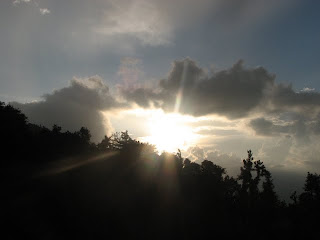
Rarely have I come across a person who has read
VS Naipaul and not had an opinion of him. Chinua Achebe once complained Naipaul wrote about Africans but not for Africans, Edward Said called his work an "intellectual catastrophe", Derek Walcott called him "V.S.Nightfall", a reviewer of his book complained that Naipaul's aim was the desecration of his audience. Equally his admirers credit him with a Conradian style, a world vision, absolute honesty and clarity to simplify. So it is fitting that Naipaul received a wonderful biography in “
The World Is What It Is” by Patrick French.
A weaker man would have tried to exonerate himself of the accusations of his illustrious colleagues (
Paul Theroux and others). But by being honest to the point of being brutal, Naipaul the enigma has left his admirers and detractors awe struck. There simply cannot be a more honest biography of a living person.
The opening paragraphs of the book begin with a young Brahmin at the turn of the century duped to make a journey across the world from India to Trinidad. The journey by sea almost kills him, the work on a sugar plantation enervates and breaks him. But with a shrewd vision the young man becomes one of the richest people in Trinidad. The young man was Caplideo Maharaj, Vidiadhar Surajprasad Naipaul's maternal grandfather. Naipaul's younger days during the 30s and 40s of Trinidad are described in vivid detail. This part of the book reads almost like a second version of his masterpiece "
A House for Mr Biswas".
In 1950 Naipaul leaves for Oxford on a scholarship. He meets Patricia Hale, a fellow student from lower-middle class background. He sees Trinidad as a place of no hope and prefers the mother country. The intense loneliness of his early English years are combined with no job prospects and he sinks into depression. He marries Pat but doesn't buy her a ring. His father passes away but he cant attend the funeral. In all this turmoil he publishes his first book "
The Mystic Massuer". A few years later he publishes his masterpiece, "A House for Mr Biswas" , a fictional recounting of his father, Seepersad Naipaul's life. The book is still hailed as a post-colonial masterpiece. In 1971 "
In a free state" won the Booker and suddenly Naipaul is short of ideas and needs stimulation.
His marriage to Pat is troublesome but survives. She is his companion, the first reader of his work, an honest reviewer, his mother, his house-maid and assistant. As Naipaul's fame grows she looses her independence. Into this fraught marriage enters Margaret, an Anglo-Argentine woman. Naipaul meets Margaret on the trip to Buenos Aires and they begin a relation that would last a quarter century. When asked about the relation, Naipaul curtly replied, "It was definitely not a meeting of the minds." The sex with Margaret helped him immensely. It resulted in rejuvenated works like "
A Bend in the river", "
Among the Believers" and "
India: A Million Mutinies Now". Naipaul says. "I was very violent with her for two days with my hand; my hand began to hurt........My hand was swollen.I have enormous sympathy for people who do strange things out of passion." French summarizes the situation," Mama at home, a whore in South America."
All through this infidelity, Naipaul and his lovers exhibit a tremendrous sympathy for the writer in him. Margaret became his companion on his travels, while Pat was the reviewer of his work. Pat, low on self-esteem, now withdrew and suffers from cancer. "His nihilism begat her nihilism. They fed off eachother's negativity." In the end Pat dies of cancer and Vidia invites Nadira Alvi, a Pakistani journalist into the same house to marry him. The book ends with the scattering of Pat's ashes.
I have one complaint of the book, that I wish it was longer. For a 500 page book that is as good a compliment as any. The book ends in 1996, but why not 2002 when he won the
Nobel? Why not much later, since Sir Vidia is still alive? Maybe there are two Naipauls, the writer who is compassionate but unsympathetic, truthful but selective, uncompromising and unyielding. And the person who is selfish, indecisive and lives in a perennial service of literature.
French claims Naipaul's decision reveal everything about his life is one filled humility and narcissism. It was hard for me to understand how a person could be both. But I did not have to look far. In a letter to Pat during his Oxford days, a young Naipaul wrote. "I love you, and I need you. Please don’t let me down. Please forgive my occasional lapses. At heart I am the worthiest man I know." It is French's understanding and courage as much as Naipaul's honesty that gives this biography a novel like beauty. Fiction is to make sense, but non-fiction can shock, terrify and deepen our understanding of complicated things. In the end I believe, Sir Vidia may have found the home he was always looking for, in this book.
 (Image: Some youngsters threaten suicide if Telangana statehood is agreed.)
(Image: Some youngsters threaten suicide if Telangana statehood is agreed.)

















